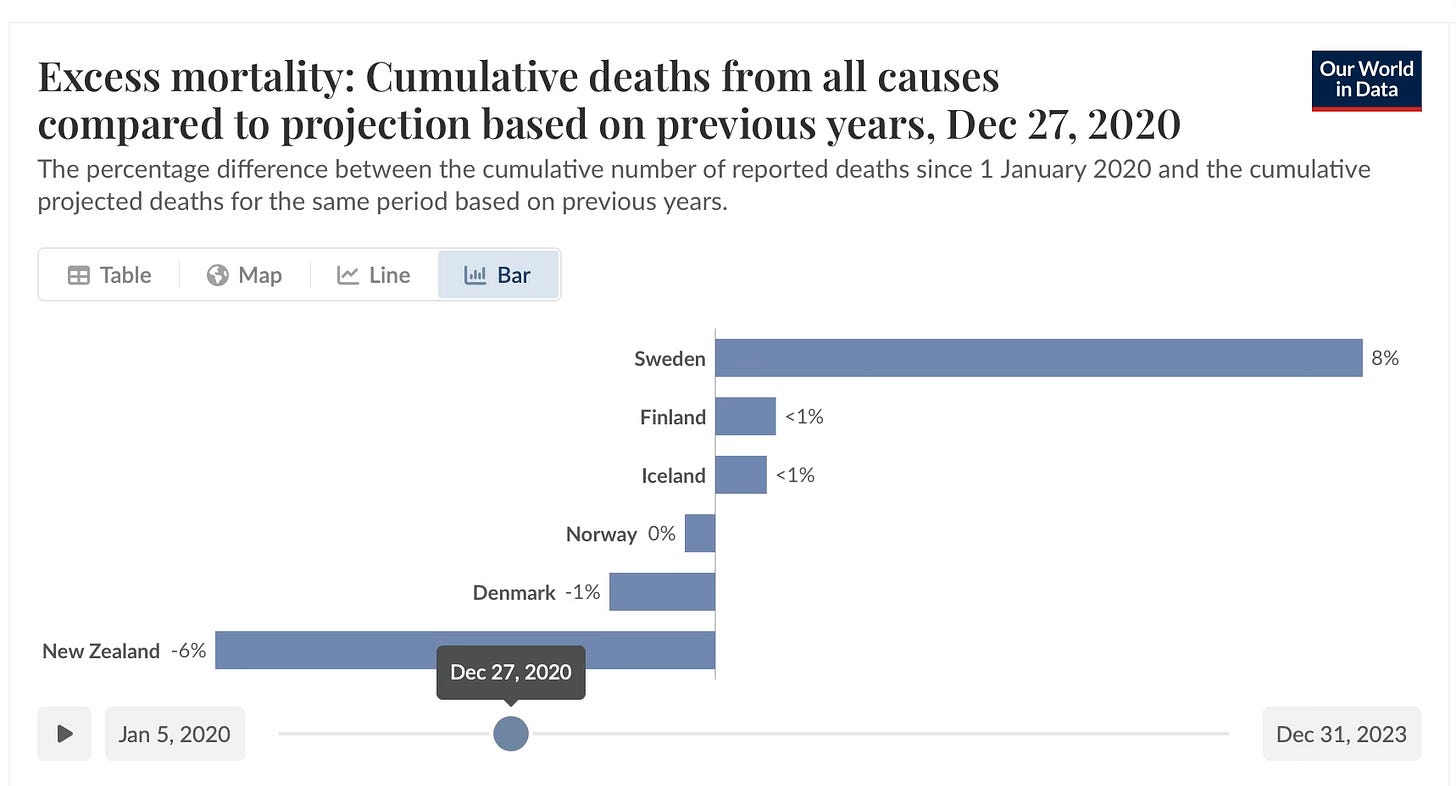Let's see what really failed during COVID
No, Sweden's initial "laissez-faire" approach to COVID-19 wasn't a huge success
There’s a new wave of books coming out arguing that the so-called No-Pharmaceutical-Interventions (NPIs) adopted or attempted by most of the countries in the world (with degrees of intensity and success that varied immensely) during the recent COVID-19 pandemic were a mistake, a sign of “madness” or of anti-scientific ideological dogmatism. In the more cerebral corners of mass media, The Atlantic is reacting to the revisionist line with disgust; The Economist is applauding.
The most (un)popular of the NPIs were, of course, lockdowns and mask mandates, which were, respectively, economically costly and quite annoying. The purported scientific/epidemiological (and highly specious) arguments that they also were unwarranted and/or useless are nicely dealt with in the Atlantic piece; here I'd like to talk briefly about hindsight and survival bias, and Sweden.
One way to define hindsight bias is saying that many mistakes are painfully obvious mistakes — but only after they have been committed and their consequences are well understood. It’s unfair to use our post-hoc wisdom to make value judgments about what people did in the past, when they didn’t know what we do know now, and hadn’t lived through what we lived.
Of course, in hindsight, there were wrong decisions about NPIs. Some lockdowns lasted too long; social safety nets for those outside the “laptop class", who couldn't stay at home without risking losing much of their income, were inadequate; emotional and psychological needs went unmet.
Mask mandates are useless if people won’t (or can’t, or don’t know how to) wear masks properly. The mismatch between behavioral science and epidemiology was perhaps the most significant scientific blunder of the pandemic response. Nonetheless, in the first year of the COVID-19 crisis, before the vaccines arrived, NPIs were all we had. In that year, the confirmed number of lives lost to the disease, worldwide, was one million, but the real total can be as large as 6 million.
It could've been so much worse: two papers published in Nature in mid-2020 estimated, at that point, 3.1 million lives saved in Europe thanks to lockdowns, and 61 million cases averted in the US. There's a significant gap between inadequate or poorly implemented and outright useless or wrongheaded.
Here we get to survival bias: after you survive, the precautions that led you to this happy outcome suddenly seem excessive. If you wear a seatbelt all your life and never get in a car crash, don’t you sometimes stop and think, “Why bother?”
And then, Sweden. Revisionists love to throw lines like “Sweden never mandated masks or staying at home, and kept most schools open (…) Yet its excess-death rate after a year of COVID was one of the lowest in Europe.” (This from The Economist.) But is Europe a good general comparison to Sweden, considering its unique Nordic characteristics? What about the other Nordic countries? And, to use an extreme case as a control, consider New Zealand (another small, democratic, peaceful, highly homogeneous developed country), which imposed stringent COVID-19 restrictions.
Here are the numbers from the pre-vaccination period:
So, comparing apples with apples, not so much of a success.
The pandemic response demands, of course, a post-mortem. We need to know what worked, what didn’t, and why, to be better prepared for the next one. Because there will be a next one: we live in a world of globalized travel, where natural habitats — reservoirs of unknown pathogens — are being invaded haphazardly every day. A world of climate change, where mosquitoes and other disease-spreading agents feel more and more at home in more and more environments.
The revisionist autopsies, however, suffer from the same illness that affected the worst mistakes of pandemic response: political animus overriding reasonableness. Yes, liberals were unsufferably hypocritical when they pivoted from lockdown-at-any-cost fundamentalism to lets-have-just-one-more-BLM-protest. Yes, some mask advocates sounded like fire-and-brimstone preachers; yes, legitimate concerns with jobs and mental health weren't adequately addressed, but often shamed or laughed out of the room.
But again, measures that are imperfectly or too forcefully implemented, or defended by vocal people who may be insincere, overbearing, holier-than-thou, or just obnoxious, are not necessarily wrong, in a technical sense, or empirically misguided.
One thing is to say that lockdowns and school closures lasted too long after vaccines became available, and that the mitigation of the collateral damage (social, economic, emotional, psychological) the social and mobility restrictions caused was deeply flawed; another, quite different, is to say that the world could have done just as well, or even better, without such restrictions.
We should distinguish between the two very carefully: one brings valuable lessons, while the other breeds complacency and sets us up for catastrophe.



